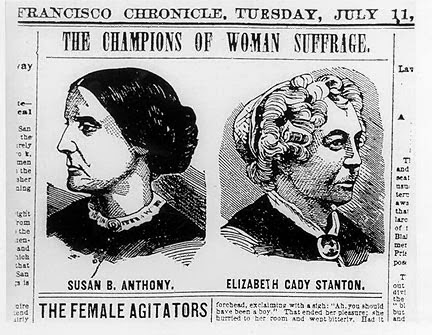Is it a crime for a U.S. Citizen to vote?
–Susan B. Anthony

Susan B. Anthony recognized that without the right to vote women would keep fighting the same battles for equality over and over again. She traveled many miles, giving hundreds of speeches, gathering thousands of signatures on petitions, and organizing suffragists, to press for women’s suffrage.
In 1872 Susan B. Anthony forced the issue. The newly added Fourteenth Amendment to the United States Constitution granted equal protection under the law, and defined citizens as anybody born or naturalized in the United States. The law was passed to protect freed black people in the aftermath of the Civil War. As a citizen, Susan B. Anthony decided to test the Amendment and went with her sisters and several other women to vote. After casting her ballot Susan B. Anthony wrote, “I have been and gone and done it…positively voted…” (p.424 Life & Work)
Soon after, a federal marshal showed up at Susan B. Anthony’s door to arrest her for wrongfully and willfully voting. She insisted the marshal arrest her properly and take her to the police station. In between her arrest and her trial, Susan B. Anthony spoke in all 28 towns and villages in Monroe County, New York, asking “Is it a crime for a U.S. citizen to vote?” At Susan B. Anthony’s trial, the judge ordered she be found guilty without deliberation, and fined her $100. She refused to pay. To avoid an appeal, the judge did not throw Susan B. Anthony in jail.
In 1875, the Supreme Court of the United States decided that women were indeed citizens but that citizens do not necessarily have the right to vote. It was up to the states to decide voting requirements beyond what was written in the Constitution. Southern states instituted poll taxes and literacy tests that, in addition to the threat of lynching, effectively kept poor black people from voting until the 1960s.
It would take more than fifty years for the 19th Amendment to pass, fourteen years after Susan B. Anthony died. Widely known as the Susan B. Anthony Amendment, “the right to vote shall not be denied on account of sex,” became the law of the land in 1920.
Click here for a link to Historic Speeches on Suffrage.
